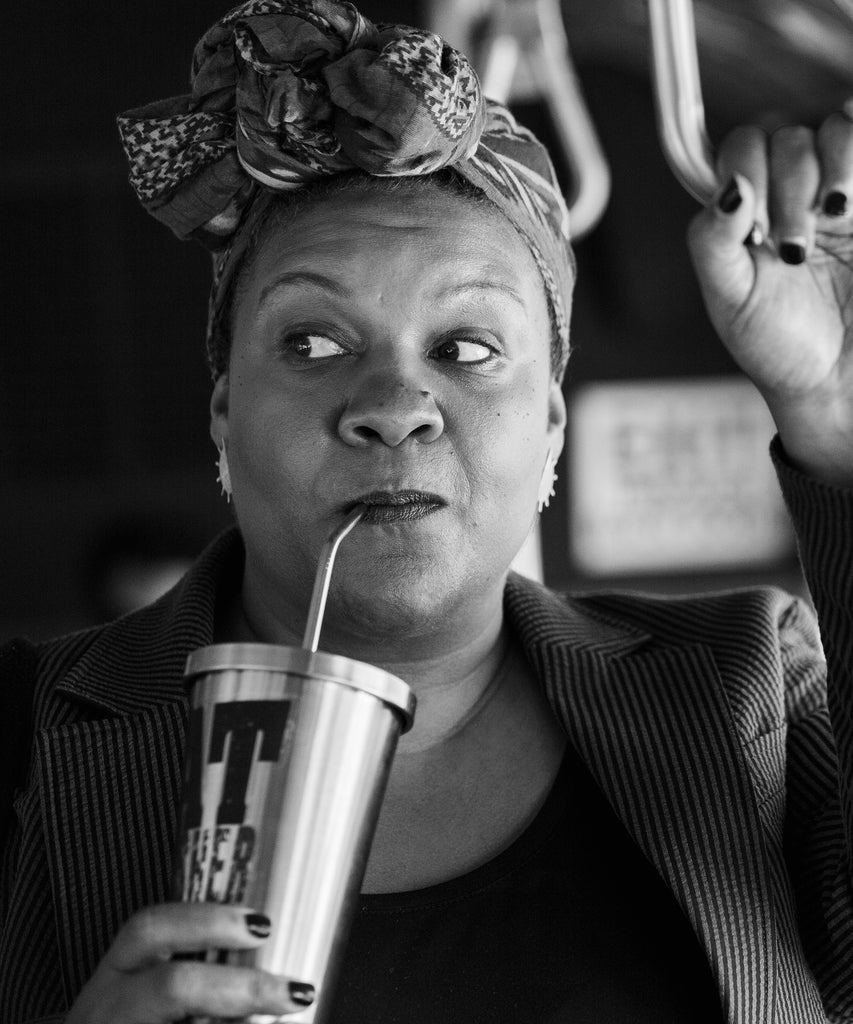
This story contains spoilers for The Forty-Year-Old Version, streaming on Netflix October 9.
When we first meet protagonist Radha in The Forty-Year-Old Version, she’s going through a personal and creative rough patch. On the verge of 40, it’s been nearly a decade since her big break put her on a “30 Under 30” list of playwrights to watch, and her mother’s recent death has thrown her into a downward spiral. Lost and a little depressed, her days are split between teaching theatre to a group of Harlem high school students, verbally sparring with her agent and best friend, and downing one diet drink after another. And then, in a moment of desperation, Radha decides to reinvent herself as RadhaMUSprime, a rapper whose verses give voice to her frustration.
Shot in black and white on 35mm film, The Forty-Year-Old Version follows Radha on a journey towards self-acceptance, but also creative fulfilment, as she figures out the best way to authentically express herself through her art in a world that doesn’t want to make space for her vision.
Writer and director Radha Blank loosely based her debut feature on her own experience as a playwright in New York City struggling to make her voice heard. Radha is “about 65% me,” she recently told The Guardian, noting that some of her friends star in the film, as does her real brother, and that she used her late mother’s art and jazz drummer father’s music.
Likewise, RadhaMUSprime is a real alter ego that Blank used while performing in small New York City clubs. The name, she later realised, was inspired by Rodimus Prime, a character from Transformers that happened to be one of her favourite shows growing up.
“RadhaMUSprime as an alter ego really did save me,” Blank added in the Guardian interview. “What I love about hip-hop music is if you have a skill with a pen it really doesn’t matter what you look like. I used RadhaMUSprime to celebrate having a May to December romance, and I have a fat girl sex anthem. In my normal life I’m always dieting, whereas RadhaMUSprime doesn’t care. She celebrates her rolls!”
Throughout the film, Radha chafes under the edits that a white male producer and white woman director require she make to her play, Harlem Ave. What started out as an exploration of one Black family’s experience with gentrification eventually turns into a piece aimed to appease white audiences’ guilt, an artistic compromise that Radha struggles with throughout the story. Does she accept that this is what it takes to break in with a commercial hit? Or does she stick to her own story and do it her way, with the risk that she might keep failing?
Much like her character, Blank started working on her passion project in the aftermath of a professional setback. In June, she told Backstage that she had been hired to write an adaptation of a best-selling book, only to be fired after submitting the second draft. “After getting fired, I felt like I wasn’t in control of what I was making as an artist,” she said. “I needed very desperately to create something of my own.”
Still, it took her six years to get this project off the ground, largely because she wanted to portray a more nuanced version of Black womanhood than mainstream Hollywood producers were comfortable with. It wasn’t until Lena Waithe signed on as a producer that Blank was able to make the movie she wanted.
“I don’t know that I would’ve made this film if it wasn’t for Lena trusting me with my own vision,” she said during a panel at the ESSENCE Festival of Culture’s Entertainment All Access program in June.
Another significant parallel? Blank had originally conceived of the movie as an episodic series, which ground to a halt after her mother’s death, a world-altering event that threw the director into a crisis. “What started as a scripted web series transformed into a way to grieve my mother (live show) and then grew into what it is today: a fkn movie,” Blank wrote in an Instagram caption marking the anniversary of her first show as RadhaMUSprime in 2013.
Other elements of the film are loose interpretations of real experiences. For example, Radha’s romance with D, her producer played by real-life rapper Oswin Benjamin. “That character is an amalgam of a lot of people I’ve dated, people I’ve met in music, and I tend to skew younger, so that part is true,” she told The Guardian. Same goes for the scene where her aforementioned white male producer suggests that she might be a great fit to write a Harriet Tubman musical, which Blank based off decades of trying to break into the New York theatre scene.
It’s fitting then, that where real life and The Forty-Year-Old Version really diverge is in the movie’s ending. On opening night, Radha realises that she’s sold out as an artist, allowing others to take over her voice in a desperate attempt to matter. In Blank’s case, the opposite happened. In February, she became the second Black woman to ever win the Sundance Film Festival’s prestigious U.S. Dramatic Directing award. Her film is unique and original, and has launched her as an auteur ready to take on an often hostile industry.
“I’m in my 40s and made my first film,” she told Vice in the aftermath of her win. “Being true to myself, not apologising for who I am and what I want to say is why I’m here. Don’t compromise your vision. Just keep pushing forward.”
Like what you see? How about some more R29 goodness, right here?
The Top 10 Titles Streaming On Netflix